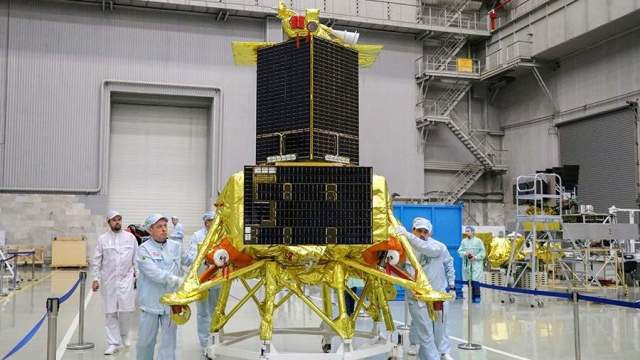For the first time in almost 50 years, Russia sent a ship to an Earth satellite
In Russia, for the first time in the modern history of the country, an interplanetary station, called Luna-25, went to the moon. This event opens a new chapter in the exploration of space and the Earth's satellite. For more information about what the station is and how the expedition will take place, see the Izvestia material.
What is the Luna-25 station?
Luna-25 is a Russian project to launch automatic spacecraft to the moon to explore near—lunar space and opportunities for practical use of the satellite. This is the first Russian lunar mission. And the serial number 25 indicates that such a device has been known for a long time. Its development began in the Soviet years. The last mission took place in 1976 and was called Luna-24. She confirmed the assumption about the presence of water on the moon.
However, unlike its predecessors, Luna-25 (formerly Luna-Globe) is a completely new technical solution. The device is much lighter, which was achieved thanks to more durable and lightweight materials, and has modern devices — antennas, sensors and an engine that were developed and manufactured in Russia.
With the launch of the new lunar station, the country hopes to strengthen its competitive political position and once again become a major player in the field of space.
The mission is led by the Roscosmos State Corporation, the Space Research Institute of the Russian Academy of Sciences (IKI RAS) and the Lavochkin NGO. The scientific director of the project is Academician Lev Zeleny, the chief designer is Pavel Kazmerchuk.
Tasks of the expedition on the Moon
The purpose of the mission is to test the soft landing technology of the space station in the conditions of a lunar night, as well as to create a map of the lunar landscape for the landing of future vehicles.
Another task is to conduct a wide range of studies of the Moon's exosphere. First of all, we are talking about the search for water, the study of the dust and plasma component of the lunar exosphere and the radiation situation. All this is necessary to find out whether there is a possibility of human exploration of the Moon in the future.
In addition, scientists will continue to study the origin and evolution of the Moon. The results of the work of the Russian station will help answer the question whether the Moon was once part of the Earth and broke off as a result of the collision of the planet with a large celestial body.
How was the launch of Luna-25
The launch of the mission took place on August 11 at 02:10 (Moscow time) from the Vostochny cosmodrome in the Amur region. The Soyuz-2.1b carrier rocket with the Fregat upper stage launched the station on the flight path to the Earth satellite.
The rocket with the station was taken to the launch complex on August 8. Moreover, the launch was previously planned from the Baikonur cosmodrome in Kazakhstan. But later the place was moved. Thus, the reboot of the Russian lunar program took place on its own territory.
When and where will the ship land
As Izvestia was told at the Space Research Institute, on August 16, the station will enter lunar orbit, and landing on the Moon will take place approximately on August 21 in the area of the lunar South Pole. 30 kg of cargo will be delivered there, including unique instruments for research.
The South pole for landing was not chosen by chance. Scientists believe that it is here that volatile compounds, which may contain water, and traces of the early development of the Solar system are contained. Russia will be the first country in the world to land on this part of the moon.
The station will operate there for one year.
Reaction of the Western media
In the West, the launch of Luna-25 was called a test of Moscow's resilience against sanctions and the intention to demonstrate that Russia is capable of implementing such projects without cooperation with the West. So, according to Politico, if Luna-25 can be gently planted, it will be a huge achievement for Russia. In addition, the country will make a big step forward in plans to build a lunar base together with China by the 2030s.
The mission has political significance and plays an important "psychological role" for the Kremlin, The Guardian newspaper wrote. At the same time, the article notes, this is a peaceful competition in which "scientists and technologies from different countries" are compared.
Reuters, in turn, recalled that the European Space Agency (ESA) had previously planned to test its Pilot-D navigation camera by attaching it to Luna-25, but severed ties with the project after the start of the Russian special operation in Ukraine.
Earlier, Izvestia wrote when the launches of the next lunar missions will take place.

